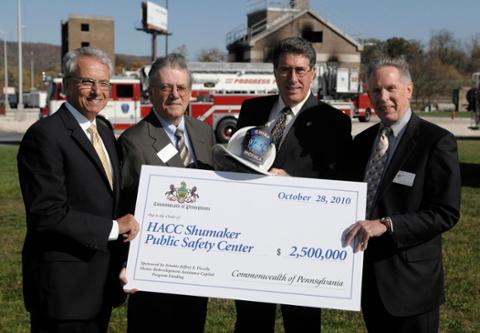
Oct. 28, 2010
HARRISBURG – Sen. Jeffrey E. Piccola, R-15, today announced funding of $2.5 million toward a major renovation and expansion of the Sen. John J. Shumaker Public Safety Center (PSC) at HACC, Central Pennsylvania’s Community College.
Piccola, chairman of the state Senate Education Committee, made the announcement today during a formal presentation to HACC officials at a ceremony at the PSC. The funding is from the state Redevelopment Assistance Capital Program (RACP) to benefit the $15 million phase one of a master plan to expand and upgrade the 12-acre complex that serves more than 30,000 first responders and healthcare workers a year.
“Central Pennsylvania is fortunate to be home to a public safety center that offers state-of-the-art training and education to those who provide invaluable services to our communities and the region which we simply cannot do without,” Piccola said.
“Recognizing the great work accomplished by the PSC and the growing demand for high quality training, I am pleased to support and present this state funding in an effort to continue assisting the mission of this facility and continuing the legacy of my predecessor in the Senate, John Shumaker,” Piccola added.
“Our region’s first responders deserve to be trained in a state-of-the-art educational facility, and this contribution is a significant step toward making that a reality,” said Ronald Young, HACC interim president. “Not only is Senator Piccola a long-time supporter of the college, he is passionate about the need for the proper education and training of first responders.”
Young was joined by Nancy Rockey, HACC vice president of community and college development and interim vice president of the Harrisburg Campus, and Board of Trustee members Donald Schell, chairman, and Frank Conte, treasurer, and a member of the PSC’s advisory board. In addition to the HACC community, members of the Halifax, Colonial Park and Swatara Township volunteer fire companies were among the first responders who attended the event.
“HACC’s strength in serving Central Pennsylvania comes from the power of the partnerships the college has forged with business, industry and the community to meet the educational and workforce development needs of the region,” said Rockey. “The PSC is a vital force for providing the resources to give our first responders the skills they need to protect and serve the region.”
With this generous gift, The Campaign to Help Tomorrow’s First Responders, Today! now stands at more than $4.4 million.
The event was staged near the fire training structures that were erected when the complex was established more than 20 years ago. The buildings are visible from nearby Interstate 81.
The PSC master plan identifies four distinct phases of expansion over a 20-year period. The first phase, targeted for completion by summer 2012 at an estimated cost of $15 million, focuses on remedies to areas in need of immediate attention, including renovation of the six-story fire training tower, smoke structure and burn building; construction of a state-of-the-art, 25-lane indoor firing range; an expanded parking lot; and additional training sites for Hazmat and other emergency situations. The second, third, and fourth phases expand the current capabilities of the center into new realms of technology and training possibilities with timetables and projected costs to be determined after the first phase is completed.
Piccola, a Dauphin County native, has represented the 15th senatorial district since November 1995, after previously serving in the House of Representatives for 19 years. Piccola has made education reform a priority by working to make public schools more accountable to families and taxpayers and fighting for more choices and options for parents. Piccola’s other legislative priorities include making Pennsylvania competitive by expanding health care access, improving the state’s business climate, eliminating the property tax and revitalizing our cities.
Please click the links below to share the latest #HACCnews on YOUR social media sites.
